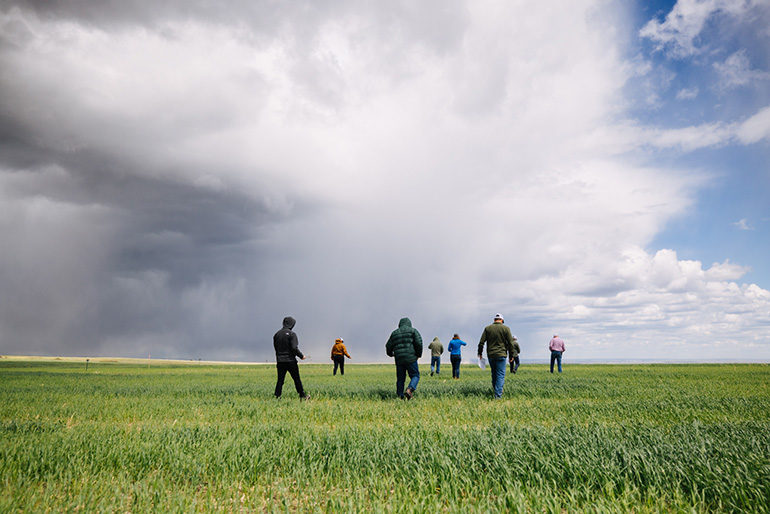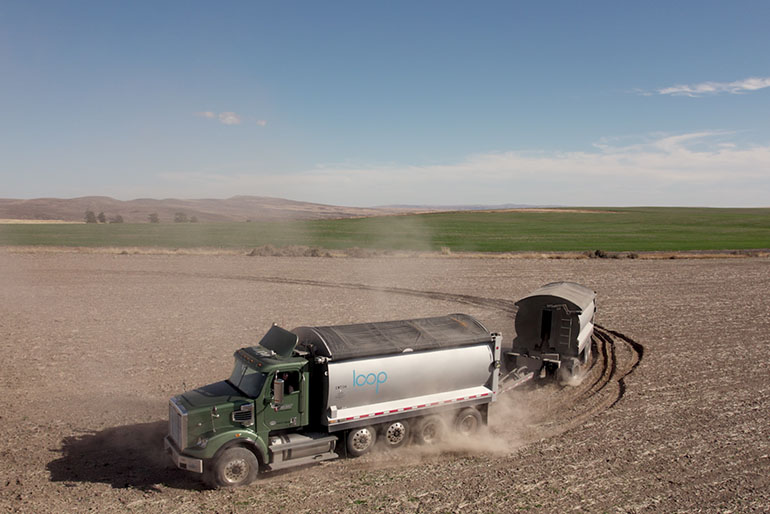VIDEO: ‘If a field is starting to produce, it’s because of biosolids’: Farmers credit King County’s Loop biosolids for stronger crop yields, better soil retention
Summary
Dec. 16, 2024: For 30 years, a mutually beneficial partnership between King County and the Boulder Park Inc. farming consortium in Douglas County has improved soil conditions, boosted crop yields, and become one of the longest-running and successful programs of its kind in the nation promoting a sustainable economy that turns wastewater into a valuable resource.
Story
Farmers in Central Washington credit the King County Wastewater Treatment Division for enhancing their drought resilience with Loop biosolids, a natural alternative to artificial fertilizers that require significant energy to produce and often contain harmful chemicals.
Loop transforms wastewater into a nutrient-rich amendment that researchers and soil scientists have found increased crop yields by up to 40%. The long-standing product supports the Wastewater Treatment Division’s mission to put recovered resources to beneficial use.
“It’s clear that for decades Loop biosolids have made a positive impact by transforming the landscape of modern agriculture and land restoration,” said Kamuron Gurol, director of the King County Wastewater Treatment Division. “By capturing and beneficially using a valuable resource, we are leading the way toward a more sustainable and climate-resilient future.”
Introduced to dryland wheat farmers in 1992, Loop has helped transform soil conditions in Douglas County with limited rainfall and elsewhere in the state. Boulder Park Inc., as the farmer consortium is called, is among the nation’s longest running biosolids land applications.
“If a field is starting to produce, it’s because it’s had biosolids,” said Douglas Poole, a farmer in the Boulder Park Inc. Consortium. “We have seen incredible improvements in our crop yields and soil conditions since we started using Loop. It's an affordable, effective, and environmentally friendly option that has transformed the way we approach soil management.”


Today, over 40 public and private permitted facilities contribute biosolids to the Boulder Park Project's beneficial use program with King County managing the contract with the farmers and making sure the biosolids meet federal and state regulations.
King County has worked with nearly 175 farmers and landowners statewide to apply Loop and has also extended its benefits to forestry lands at the Snoqualmie Tree Farm and in the Washington State Department of Natural Resources’ Marckworth Forest near Duvall to support tree growth and conservation efforts.
Regulated by the U.S. Environmental Protection Agency and the Washington State Department of Ecology, Loop’s effectiveness and safety are backed by decades of research by independent university research institutions. Biosolids products like Loop are regulated more stringently than any other soil amendment, manure, or fertilizer on the market.
Loop is routinely tested for pathogens, heavy metals, and trace chemicals to meet federal and state regulations and to ensure a high-quality product for use on farms and forests. King County has also begun proactively studying the county’s biosolids for the presence of per- and polyfluoroalkyl substances, or PFAS, a group of human-made chemicals that are found nearly everywhere including wastewater. King County’s proactive work will complement efforts with regulators, public health experts and others to curb the sources of these chemicals, reduce exposure to people, and protect communities and the environment.
Among the many benefits of Loop is a reduction in greenhouse gas emissions by sequestering more than 42,000 metric tons of carbon each year — equivalent to taking 9,000 cars off the road annually. It also protects water quality by increasing the soil’s moisture-holding capacity to better absorb rainwater, mitigating runoff and algae blooms. Its moisture retention is especially beneficial to Central Washington farmers experiencing increased droughts.
The Wastewater Treatment Division is one of four divisions at the Department of Natural Resources and Parks.
Multimedia
- VIDEO: Loop biosolids transform Washington farms
- PHOTO GALLERY: Farmers apply Loop biosolids
- TRACKS: An interactive map of environmental stewardship in King County
Resources
- Loop biosolids: Leading with science
- King County's actions for PFAS forever chemicals
- Loop truck shop improves drive time for cross-state biosolids delivery
Quotes
It’s clear that for decades Loop biosolids have made a positive impact by transforming the landscape of modern agriculture and land restoration. By capturing and beneficially using a valuable resource, we are leading the way toward a more sustainable and climate-resilient future.
If a field is starting to produce, it’s because it’s had biosolids. We have seen incredible improvements in our crop yields and soil conditions since we started using Loop biosolids. It's an affordable, effective, and environmentally friendly option that has transformed the way we approach soil management.

 Translate
Translate